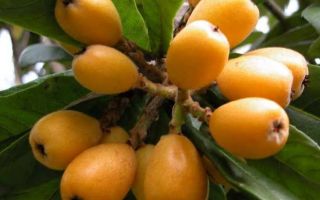Content
- 1 Medlar: what is this fruit
- 2 What does the taste of medlar look like?
- 3 Composition and calorie content
- 4 What is useful medlar for the body
- 5 Is it possible for children to meddle
- 6 The use of medlar in traditional medicine
- 7 Use in cosmetology
- 8 Medlar leaves: healing properties
- 9 Medlar bone: useful properties
- 10 Medlar in cooking
- 11 How to eat medlar fruit
- 12 Harm and contraindications
- 13 Conclusion
Medlar is an exotic fruit that is nevertheless often found on store shelves. What are the benefits and harms of medlar - an interesting question for those who have never tried such a fruit.
Medlar: what is this fruit
Botanically, the fruit plant belongs to the Pink family. Historically, China is considered its homeland. There are two types of plants - Japanese and Caucasian, or Germanic, medlar. Despite belonging to the same genus, they are fundamentally different from each other. Fresh fruits of the Japanese fruit plant are most often used, Caucasian medlar can be found in confectionery.
Outwardly, the yellow-orange fruit is very similar to an apricot - it is easy to confuse them. It is called by different names - lokva, or shesek, or biwa. In all cases, the same fruit is meant.
The plant belongs to the category of evergreens, therefore the medlar tree is often used in landscape design. But, since the great benefits are hidden in the fruits of the fruit, it is interesting to consider it from a culinary and medicinal point of view.

What does the taste of medlar look like?
The taste of the fruit depends on the type of plant. If we are talking about the Japanese medlar, then it looks more like a quince or an ordinary pear and tastes sweet or slightly sour. But the German medlar has a pronounced sour, tart and astringent taste. Only a big lover of exotic will eat it fresh.
Composition and calorie content
The benefits of medlar are hidden in its composition - the pulp of the fruit is filled with the vitamins most necessary for human health. By eating a few berries, you can get in large quantities:
- vitamin P and PP;
- vitamin C;
- vitamin A;
- trace elements sodium and potassium.
Also, the fruits of the plant contain natural sugar, pectins, natural fruit acids.
The energy value is very small - there are only 47 calories in 100 g of the fruit of the delicious Japanese medlar. Nutritional useful properties are represented mainly by carbohydrates, of which there are more than 10 g in medlar. Small portions are occupied by proteins and fats - 0.43 g and 0.2 g, respectively.

What is useful medlar for the body
How exactly is the benefits of an exotic fruit manifested? Vitamin-rich fruits contribute to:
- normalization of blood pressure;
- strengthening of blood vessels;
- improving the heart rate;
- improving the body's ability to self-regenerate;
- increased immunity.
Also, the fruit can serve as a prophylactic agent against oncology. The beneficial properties of exotic fruits rejuvenate the body and bring vitality.
For men and women
The product benefits men and women interested in their attractiveness and reproductive health. Its fruits allow you to maintain youth longer, improve skin condition, insure against the appearance of early wrinkles.

The positive effect on blood vessels is significant for women, since it facilitates the periods of menstruation. And for men, the benefit is expressed in the fact that the fruit helps to maintain potency and prevents the development of prostatitis.
For pregnant women and breastfeeding
The juicy fruit is perfect for consumption during the period of gestation. The benefits can be enormous - the fruits of the medlar can maintain the vitamin balance in the woman's body.

It is recommended to feast on medlar during lactation. The valuable substances contained in the fruits will enter the mother's milk, and with it - into the baby's body.
Slimming
Exotic fruits are great to include in your diet. There are almost no calories in medlar, but it contains more than enough dietary fiber. Due to this, fast saturation occurs and the bowel function improves.
Is it possible for children to meddle
Vitamins and trace elements are very important for the healthy development of a child - therefore, children can be given fruit. True, it is better to start feeding a baby with medlar after 3 years and after consulting a doctor.
Sometimes the fruit can cause allergies. Therefore, for the first time it is worth giving the child only a couple of berries - and follow the reaction of the body.
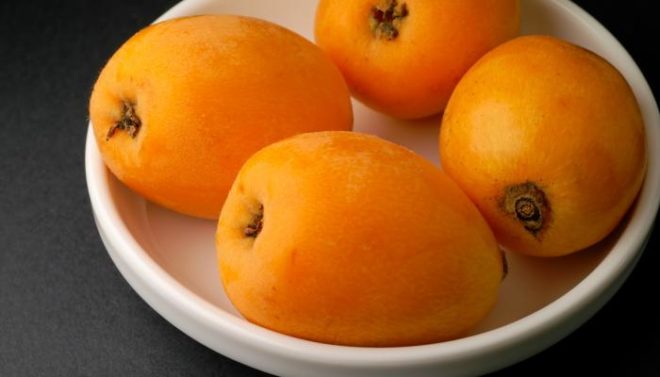
The use of medlar in traditional medicine
The benefits of the fruit do more than just improve overall health when consumed regularly. The fruits are used as a folk remedy for the targeted treatment of ailments. The Caucasian medlar has a particular benefit, the fruits of which:
- serve as a good laxative - if you choose a ripe medlar;
- stop diarrhea - if you eat slightly unripe fruits with an upset stomach;
- quickly increase insulin in the blood and lower sugar levels;
- help to cough up with colds, as they thin phlegm;
- serve as an effective diuretic;
- equalize blood pressure with its sharp drops.
The fruit is effective as a cleansing agent - adding it to the diet removes cholesterol, toxins and even heavy metals from the body. Medlar tincture can be a good pain reliever for abdominal cramps.
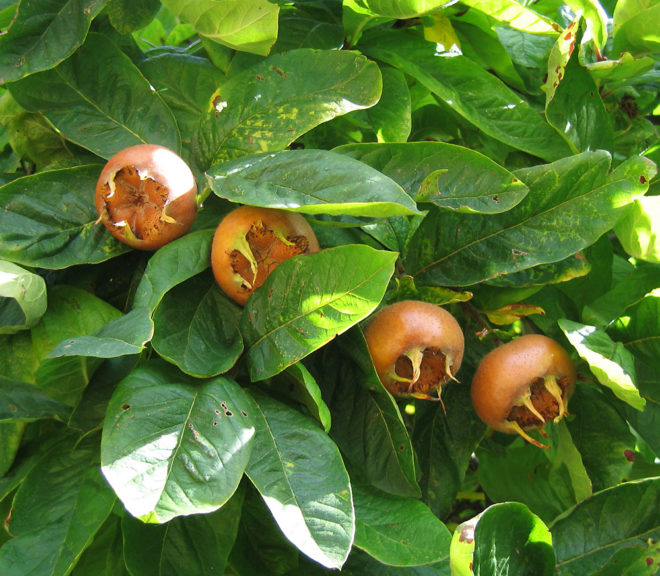
Use in cosmetology
Since the fruits of an exotic fruit contain many astringent components, antioxidants and vitamin A, medlar is actively used to create cosmetic masks and creams. Its extract can be found in many products aimed at smoothing wrinkles and eliminating acne.
You can also create home care products from Japanese and Caucasian medlar. For instance:
- use the grated pulp of ripe fruits, carefully crushed seeds and honey to prepare a gentle scrub;
- Mix the pulp of several berries with peach and olive oil for a nourishing moisturizing mask.
If you apply masks with medlar on your face at least 2-3 times a week, your skin will soon become much softer and more elastic, and fine wrinkles will be smoothed out without a trace.
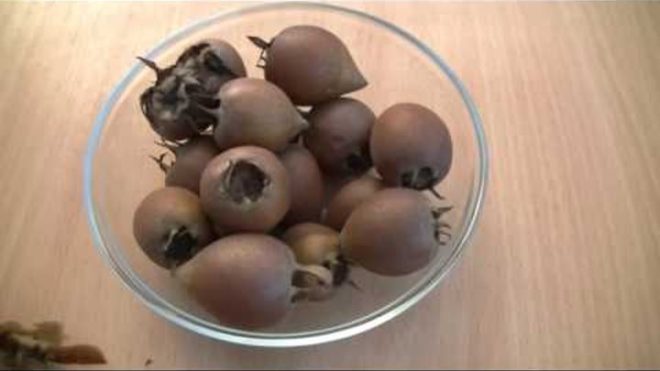
Medlar leaves: healing properties
For treatment and skin care, not only the pulp of ripe fruit is used. A great benefit lies in the leaves of the plant of both varieties - Japanese and Caucasian. The leaves also contain a lot of valuable substances - antioxidants, tannins, absorbents.
- A decoction of the leaves of the plant saves with diarrhea. A handful of leaves are poured with boiling water, insisted for 4 hours, then filtered and drunk - a few sips half an hour before meals.
- You can take such an infusion with a healthy intestine - just for prevention. The tool will help lower cholesterol and remove toxins.
- Tincture from the leaves of an exotic plant has a mild analgesic and anti-inflammatory effect.It will be of great benefit for joint ailments.
- A decoction based on medlar leaves is good for colds. The tool fights viruses and infections, helps to reduce fever.
- You can wash your face with a decoction of the leaves of the fruit plant in the morning. Tannins in its composition will even out the relief of the skin, make it a little lighter, cleanse and narrow the pores.
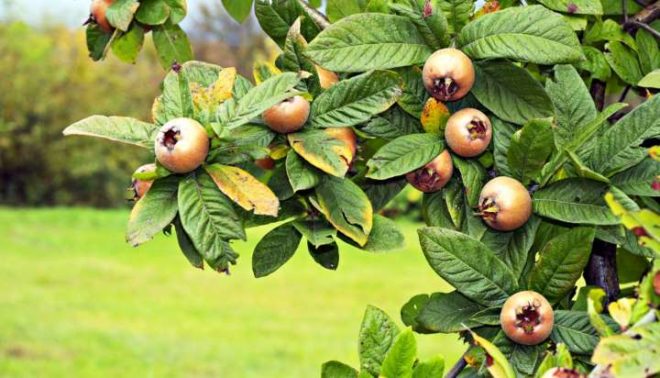
Medlar bone: useful properties
The exotic fruit bone - both Japanese and Germanic - also has benefits. It can effectively replace the usual coffee in the diet. If you dry it properly, grind it thoroughly, and then fry it, then fine pollen can be brewed in boiling water.
The stone can compete with the coffee drink both in taste - they are very similar - and in properties. The tincture will invigorate the body in the same way.
Medlar in cooking
The simplest way to use the fruit in cooking is to use the fresh fruit of the Japanese medlar as a light dessert. But the berries of an exotic plant can be used in another way. For example, delicious compotes are cooked from them and juices are made, in which all the benefits of fresh fruits are preserved.
You can make jam from medlar - berries by weight should be exactly 2 times more than sugar. To taste, you can add additional ingredients to such a jam - for example, lemon, cinnamon or cloves.
The Caucasian medlar is especially often cultivated. This is due to the fact that fresh sour berries are not as pleasant to the taste as the fruits of the Japanese medlar.

- Medlar is a common ingredient in a variety of desserts.
- The berries of the plant are found in cakes, pastries and pies.
- Cut berries are often added to salads if you want to sweeten them a little.
- Meat dishes in combination with pieces of this fruit become very unusual.
How to eat medlar fruit
When faced with exotic fruits for the first time, many people wonder - how to eat an unusual fruit?
- Before eating, it is customary to cut the fruit in half and remove the bone from the core.
- If the fruit is immature or belongs to a variety with a high density peel, then it is cut with a knife so as not to spoil the impression of the fruit.
- It is also recommended to remove the peel with ripe berries, but if it is rather soft, then this is not a prerequisite.
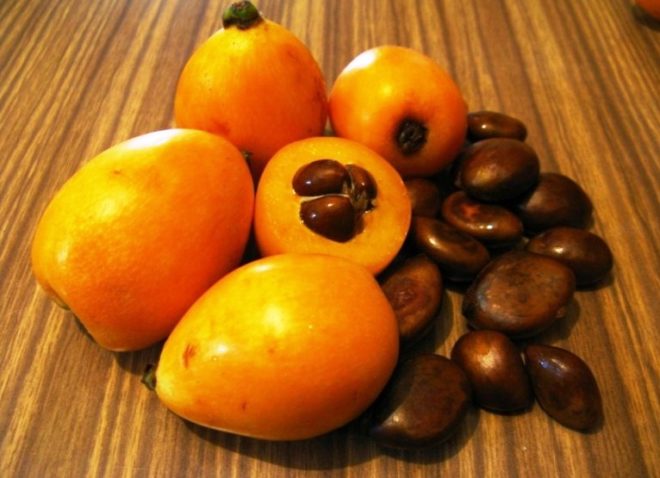
Harm and contraindications
For most people, the fruit is only beneficial. But he also has contraindications.
- Eating exotic fruits is not recommended for chronic stomach problems - ulcers, gastritis, pancreatic diseases. Like many other fruits, medlar is highly acidic and can provoke exacerbations.
- Before eating the fruit, you need to make sure that it does not cause allergies. They check it in the standard way - they literally try 1-2 berries and wait several hours, observing the reaction of the body.

Conclusion
The benefits and harms of medlar are a matter of proper use of this fruit. If there is no allergy to fruits, and the stomach does not have increased sensitivity, then you can use the fruit in any form without fear of negative consequences.

